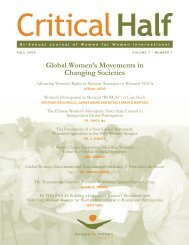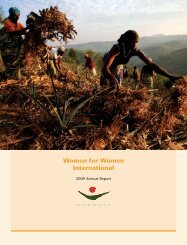Gender and Constitution Building - Women for Women International
Gender and Constitution Building - Women for Women International
Gender and Constitution Building - Women for Women International
You also want an ePaper? Increase the reach of your titles
YUMPU automatically turns print PDFs into web optimized ePapers that Google loves.
women” in the new <strong>Constitution</strong> instead of “people,”<br />
which could be interpreted as applying only to men.<br />
<strong>Women</strong> were keenly aware that they might be denied<br />
rights equal to men if the final language was at all vague.<br />
There<strong>for</strong>e, women delegates pushed <strong>for</strong> including the<br />
word “women” in most of the provisions <strong>and</strong> articles<br />
of the new <strong>Constitution</strong>.<br />
Ultimately, the Afghan <strong>Constitution</strong> was drafted so<br />
that general rules against discrimination, including gender<br />
discrimination, were included in various articles. For<br />
example, Article 50, paragraph 5, states, “The citizens<br />
of Afghanistan are employed <strong>for</strong> the state services on<br />
the basis of qualification without any kind of discrimination<br />
<strong>and</strong> in accordance with law.” On various occasions,<br />
to improve the situation of women, positive discrimination<br />
has been utilized. For example, Article 22<br />
of the Afghan <strong>Constitution</strong> states, “Any kind of discrimination<br />
<strong>and</strong> privilege between the citizens of Afghanistan<br />
are prohibited.” And the same Article, in<br />
paragraph 2, states, “The citizens of Afghanistan—<br />
whether men or women—have equal rights <strong>and</strong> duties<br />
be<strong>for</strong>e the law.”<br />
The new <strong>Constitution</strong> also provides that the state<br />
must promote special projects to improve women’s conditions<br />
<strong>and</strong> allow them to struggle against inhumane<br />
<strong>and</strong> un-Islamic traditions that violate their rights. Some<br />
of the provisions that are particularly relevant to issues<br />
of gender equality are:<br />
� Article 83, paragraph 6, which states, “In the<br />
elections, legal measures should be adopted so<br />
the elections system shall provide general <strong>and</strong><br />
just representation <strong>for</strong> all the people of the<br />
country, <strong>and</strong> at least two female c<strong>and</strong>idates<br />
should be elected from each province <strong>for</strong> the<br />
National Assembly.”<br />
� Article 83, paragraph 5, which states, “The<br />
president appoints 50 percent of the appointed<br />
delegates <strong>for</strong> the National Assembly from among<br />
women.”<br />
� Article 33, paragraph 1, which states, “The<br />
citizens of Afghanistan have the right to elect<br />
<strong>and</strong> to be elected.”<br />
� Article 43, paragraph 1, which states, “Education<br />
is the right of all citizens of Afghanistan, which<br />
shall be provided up to B.A level, free of charge<br />
by the state.”<br />
Remaining Challenges<br />
In light of the social <strong>and</strong> cultural context in which<br />
the constitutional issues were discussed, two basic weak-<br />
nesses in Afghanistan’s new <strong>Constitution</strong> remain. First, a<br />
constitution should be durable, <strong>and</strong> it will have a better<br />
chance of lasting <strong>for</strong> a long time if it has the flexibility to<br />
be changed if something does not work well. Although,<br />
at present the amendment process allows women to<br />
change or amend the provisions of the <strong>Constitution</strong>,<br />
ensuring gender equality requires a delicate balance, <strong>and</strong><br />
women are aware of the risk of the return of a fundamentalist<br />
government in the future. If one-third of the<br />
Parliament members are fundamentalists <strong>and</strong> do not agree<br />
with the gender equality provisions of the new <strong>Constitution</strong>,<br />
they also may amend the <strong>Constitution</strong>. There<strong>for</strong>e,<br />
the amendment process could ultimately be used against<br />
women.<br />
Second, there is no mechanism to monitor the implementation<br />
of constitutional guarantees, <strong>and</strong> the <strong>Constitution</strong><br />
fails to establish a complaint procedure accessible<br />
to all citizens if their constitutional rights are violated.<br />
None of the new language matters if it exists only on<br />
paper. Litigation in the ordinary courts would be the most<br />
effective mechanism <strong>for</strong> en<strong>for</strong>cement as long as this is<br />
accessible to ordinary people. If the <strong>Constitution</strong> is to<br />
be respected, the courts must be given the power to en<strong>for</strong>ce<br />
its provisions. Conversely, the jurisdiction of the<br />
in<strong>for</strong>mal justice bodies within the country should be limited<br />
so that women’s rights are not bulldozed by customary<br />
practice, <strong>and</strong> when constitutional violations do occur,<br />
women have a means of seeking redress.<br />
Lessons Learned<br />
Achieving constitutional gender equality requires a<br />
countrywide ef<strong>for</strong>t involving government officials, civil<br />
society members <strong>and</strong> women activists in all stages of the<br />
drafting process. Civic education can play an important<br />
role in raising awareness among women about their rights<br />
<strong>and</strong> about how important it is to ensure their rights within<br />
the constitution. In a country like Afghanistan, where<br />
the literacy rate is very low, especially among the rural<br />
population, widespread education can have a positive<br />
effect <strong>and</strong> raise awareness. One way to do this is through<br />
active civic education such as theater per<strong>for</strong>mances.<br />
Once women are aware of their rights, they can<br />
choose to actively participate in the social <strong>and</strong> political<br />
affairs of the country. They can change the situation <strong>for</strong><br />
other women <strong>and</strong> girls who are suffering from a lack of<br />
awareness of their own rights. For example, self-immolation<br />
is a major problem among the female population<br />
of Afghanistan. Most of these women are committing<br />
suicide in an attempt to escape abusive marriages. With<br />
awareness of their rights, more women might seek help<br />
rather than commit suicide.<br />
CRITICAL HALF 31







